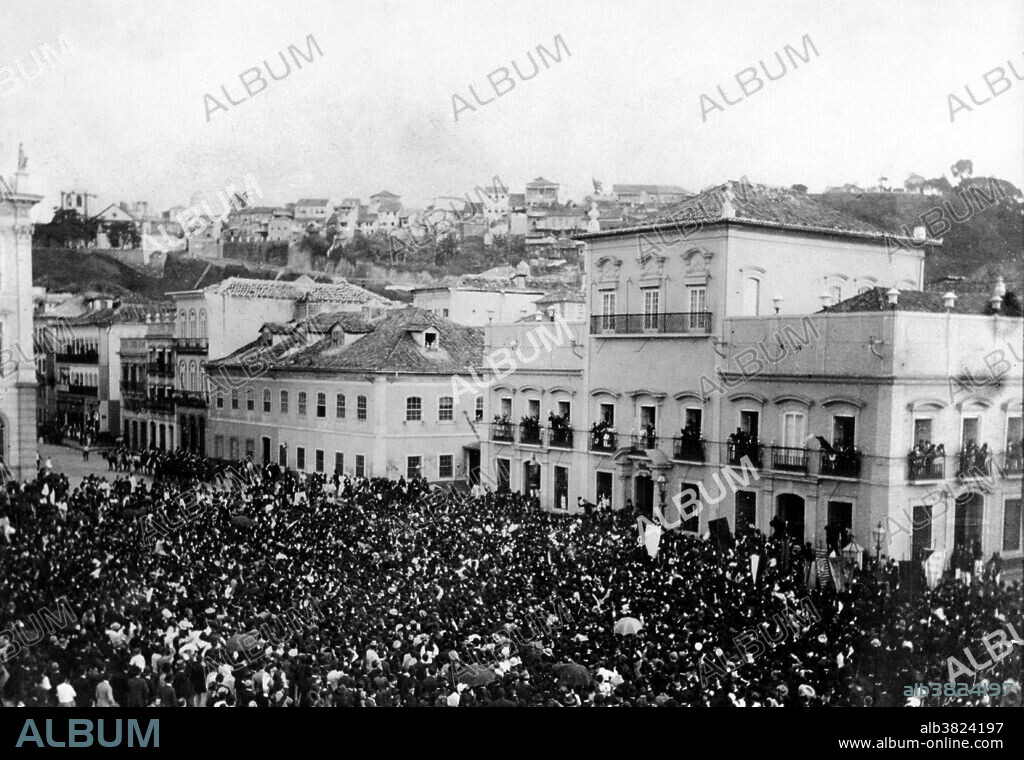alb3824197
Abolition of Slavery by Princess Isabel, Brazil, 1888

|
Añadir a otro lightbox |
|
Añadir a otro lightbox |



¿Ya tienes cuenta? Iniciar sesión
¿No tienes cuenta? Regístrate
Compra esta imagen

Título:
Abolition of Slavery by Princess Isabel, Brazil, 1888
Descripción:
Traducción automática: Abolición de la esclavitud por parte de Isabel, Princesa Imperial de Brasil, en 1888. Tras la muerte de sus dos hermanos en la infancia, Isabel (1846-1921) fue reconocida como heredera presunta de su padre. Durante las ausencias de su padre en el extranjero, Isabel actuó como regente. En su tercera y última regencia, promovió activamente y finalmente firmó una ley, llamada Lei à urea o Ley Áurea, que emancipaba a todos los esclavos en Brasil. Aunque la acción fue muy popular, hubo una fuerte oposición a su sucesión al trono. Su género, su fuerte fe católica y su matrimonio con un extranjero fueron vistos como puntos en su contra, y la emancipación de los esclavos generó disgusto entre los poderosos plantadores. En 1889, su familia fue derrocada en un golpe militar y ella pasó los últimos 30 años de su vida exiliada en Francia. Fotografía de Marc Ferrez (1843-1923)
Abolition of slavery by Isabel, Princess Imperial of Brazil, in 1888. After the deaths of her two brothers in infancy, Isabel (1846-1921) was recognized as her father's heiress presumptive. During her father's absences abroad, Isabel acted as regent. In her third and final regency, she actively promoted and ultimately signed a law, named Lei Ãurea or the Golden Law, emancipating all slaves in Brazil. Even though the action was broadly popular, there was strong opposition to her succession to the throne. Her gender, strong Catholic faith and marriage to a foreigner were seen as points against her, and the emancipation of the slaves generated dislike among powerful planters. In 1889, her family was deposed in a military coup, and she spent the last 30 years of her life in exile in France. Photograph by Marc Ferrez (1843-1923).
Crédito:
Album / Science Source / Getty Research Institute
Autorizaciones:
Modelo: No - Propiedad: No
¿Preguntas relacionadas con los derechos?
¿Preguntas relacionadas con los derechos?
Tamaño imagen:
4734 x 3269 px | 44.3 MB
Tamaño impresión:
40.1 x 27.7 cm | 15.8 x 10.9 in (300 dpi)
Palabras clave:
1888 • ABOLICIÓN • BLANCO Y NEGRO • BRASIL • EMANCIPACION • ESCLAVITUD • FAMOSO • GENTE • HISTORIA • HISTORICO • HOMBRE • ISABEL • LIBERTAD • LIDER • MASCULINO • MUJER • MULTITUD • PALACIO • PERSONA • PERSONALIDAD • PRINCESA • REAL (REALEZA) • REALEZA • REGENCIA • REGENTE • RETRATO DE HOMBRE • RIO DE JANEIRO • SIGLO XIX • SUDAMERICA
 Pinterest
Pinterest Twitter
Twitter Facebook
Facebook Copiar enlace
Copiar enlace Email
Email
